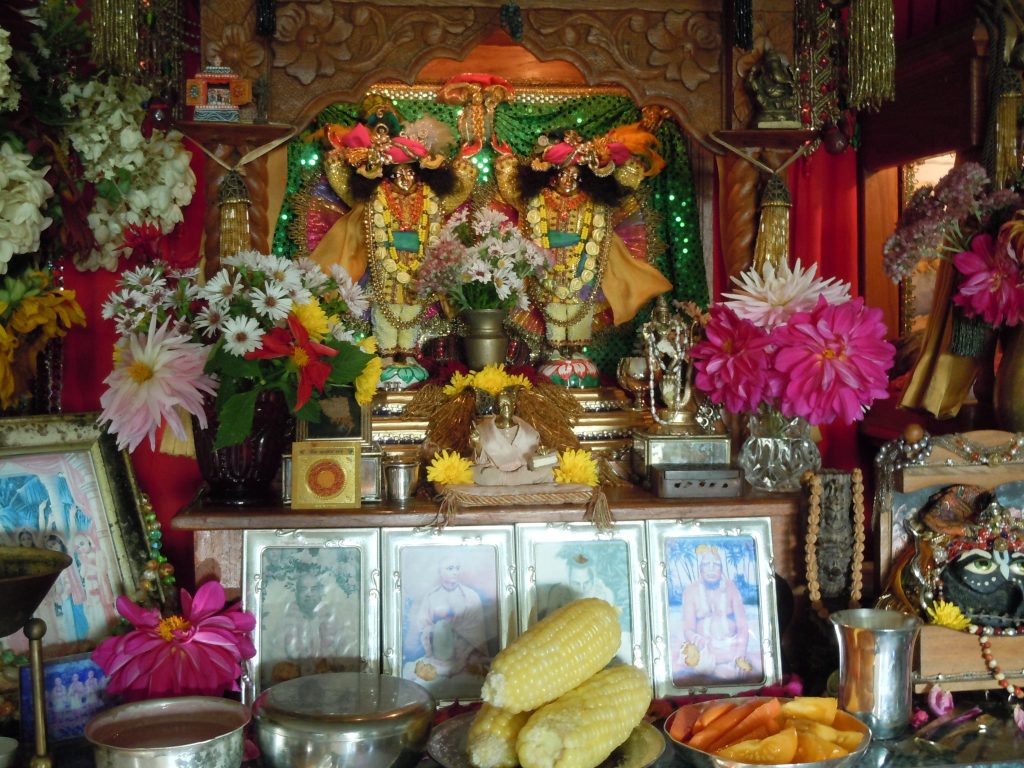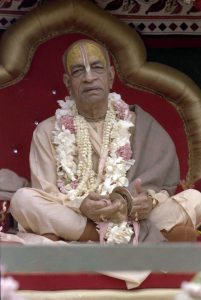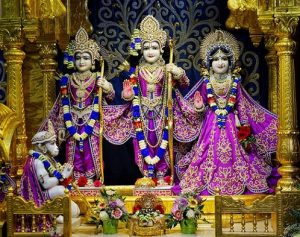Hare Krsna-
Below we have a short look at what constitutes viddhi bhakti and raganuga bhakti. It is a common thing to find some devotees who, after some time of chanting and doing some deity worship aspire to be included in the inner circle of Lord Krsna’s intimate friends and confidantes. This is a nice thing, but has to be done with intelligence and sincerely following the spiritual masters instructions. Otherwise if one is immature in understanding and behavior, his or her “seva” will only be a disturbance to the devotees and world in general.
damaghosa das
—————————-
Srila Prabhupada’s Letter to: Madhusudana — Los Angeles 24 January, 1969
Srila Prabhupada…”Regarding your question about why we dress the Deities in very opulent fashion and not as simple cowherds boy and girl, this is an intelligent question and the answer is that according to the regulative principles we cannot worship Radha-Krishna now. Radha-Krishna worship is meant for persons who have already developed spontaneous love of God. In the training period we are only worshiping Laksmi-Narayana. We worship Radha-Krishna because Laksmi-Narayana is there also, but actually we do not worship Radha-Krishna with our present Deity ceremonies; we are worshiping Laksmi-Narayana.
Narayana is there when Krishna is there, but actually we do not worship Radha-Krishna in Their Original Form. This is why we should worship Radha-Krishna in Their Laksmi-Narayana feature with all respect and reverence. If we deviate from this standard then we shall be prakrta sahajiya, or a person who takes things very cheap. We worship Laksmi-Narayana, and because Radha-Krishna includes Laksmi-Narayana, there is no necessity of installing a Laksmi-Narayana Deity. It is just like a king who is engaged in administering justice. Actually that business belongs to the justice department. But what is that justice department? It is all part of the kings energy, and the king also has the power to execute this function.”

SB 4.28.41 purport- The Lord is the Supersoul seated in everyone’s heart, and He acts as the caitya-guru, the spiritual master within. However, He gives direct instructions only to the advanced, pure devotees. In the beginning, when a devotee is serious and sincere, the Lord gives him directions from within to approach a bona fide spiritual master. When one is trained by the spiritual master according to the regulative principles of devotional service and is situated on the platform of spontaneous attachment for the Lord (rāga-bhakti), the Lord also gives instructions from within. Teṣāṁ satata-yuktānāṁ bhajatāṁ prīti-pūrvakam This distinct advantage is obtained by a liberated soul. Having attained this stage, King Malayadhvaja was directly in touch with the Supreme Lord and was receiving instructions from Him directly.
Sept 6 1976 Vrndavana–
Prabhupāda: That is viddhi-bhakti. And this is rāga-bhakti, spontaneous. Through viddhi-bhakti you have to come to the stage of rāga-bhakti. Without viddhi-bhakti, you’ll not… Because you are conditioned. Those who are liberated, they immediately get rāga-bhakti. Not by imitation. That is another thing.
NOD-Eligibility for Spontaneous Devotional Service
Persons desiring to follow in the footsteps of such eternal devotees of the Lord as the Vṛṣṇis and Vrndavana denizens are called raganuga devotees, which means that they are trying to attain to the perfection of those devotees. These raganuga devotees do not follow the regulative principles of devotional service very strictly, but by spontaneous nature they become attracted to some of the eternal devotees such as Nanda or Yasoda, and they try to follow in their footsteps spontaneously. There is a gradual development of the ambition to become like a particular devotee, and this activity is called raganuga.
We must always remember, however, that such eagerness to follow in the footsteps of the denizens of Braja (Vrndavana) is not possible unless one is freed from material contamination. In following the regulative principles of devotional service, there is a stage which is called anartha-nivrtti, which means the disappearance of all material contamination. Sometimes it is found that someone is imitating such devotional love, but factually he is not freed from anarthas, or unwanted habits. It has been seen that a so-called devotee proclaims himself a follower of Nanda,Yasoda or the gopīs, while at the same time his abominable attraction for mundane sex life is visible. Such a manifestation of divine love is mere imitation and has no value. When one is actually spontaneously attracted to the loving principles of the gopīs, there will be found no trace of any mundane contamination in his character.
Therefore, in the beginning, everyone should strictly follow the regulative principles of devotional service, according to the injunctions of the scriptures and the spiritual master. Only after the stage of liberation from material contamination can one actually aspire to follow in the footsteps of the devotees in Vrndavana.
It is said by Śrī Rupa Gosvāmī: “When one is actually liberated from material contamination, he can always remember an eternal devotee in Vrndavana in order to love Krsna in the same capacity. And developing such an aptitude, one will always live in Vrndavana, even within his mind.” The purport is that, if it is possible, one should go and physically be present at Brajabhūmi, Vrndavana, and be engaged always in the service of the Lord, following the devoteesin Brajadhāma, the spiritual realm of Braja. If it is not possible, however, to be physically present at Vrndavana, one can meditate anywhere upon living in that situation. Wherever he may be, one must always think about life in Brajadhāma and about following in the footsteps of a particular devotee in the service of the Lord.




